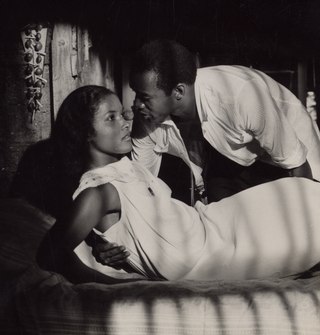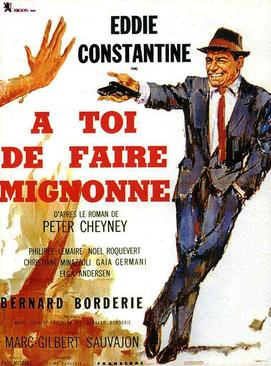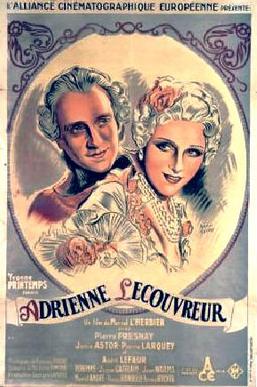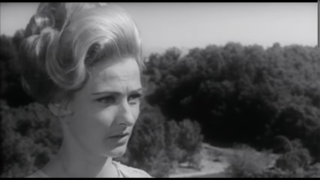Related Research Articles

Existentialism is a form of philosophical inquiry that explores the issue of human existence. Existentialist philosophers explore questions related to the meaning, purpose, and value of human existence. Common concepts in existentialist thought include existential crisis, dread, and anxiety in the face of an absurd world and free will, as well as authenticity, courage, and virtue.

French cinema consists of the film industry and its film productions, whether made within the nation of France or by French film production companies abroad. It is the oldest and largest precursor of national cinemas in Europe; with primary influence also on the creation of national cinemas in Asia.
Marcel Camus was a French film director. He is best known for Orfeu Negro, which won the Palme d'Or at the 1959 Cannes Film Festival and the 1960 Oscar for Best Foreign Language Film.

That Man from Rio is a 1964 French-Italian international co-production adventure film directed by Philippe de Broca and starring Jean-Paul Belmondo and Françoise Dorléac. It was the first film to be made by the French subsidiary of United Artists, Les Productions Artistes Associés. The film was a huge success with a total of 4,800,626 admissions in France, becoming the 5th highest earning film of the year.

Cuiabá is the capital city of the Brazilian state of Mato Grosso. It is located near the geographical centre of South America. Also, it forms the metropolitan area of Mato Grosso, along with the neighbouring town of Várzea Grande. The city's name is an indigenous Bororo word meaning 'arrow-fishing', The city was founded in 1719, during the gold rush, and it has been the state capital since 1818. The city is a trading centre for an extensive cattle-raising and agricultural area. The capital is among the fastest-growing cities in Brazil, followed by the growth of agribusiness in Mato Grosso, despite the recession that is affecting Brazilian industries. Cuiabá was one of the host cities for the 2014 FIFA World Cup.

Black Orpheus is a 1959 romantic tragedy film directed by French filmmaker Marcel Camus and starring Marpessa Dawn and Breno Mello. It is based on the play Orfeu da Conceição by Vinicius de Moraes, which set the Greek legend of Orpheus and Eurydice in a contemporary favela in Rio de Janeiro during Carnaval. The film was an international co-production among companies in Brazil, France and Italy.
An Occurrence at Owl Creek Bridge is a 1961 French short film, almost without dialogue. It was based on the 1890 American short story of the same name by American Civil War soldier, wit, and writer Ambrose Bierce. It was directed by Robert Enrico and produced by Marcel Ichac and Paul de Roubaix with music by Henri Lanoë. It won awards at the Cannes Film Festival and the Academy Awards. The film was later screened on American television as episode 22 of the fifth season of The Twilight Zone on 28 February 1964.

The Embraer EMB 110 Bandeirante is a Brazilian twin-turboprop light transport aircraft designed by Embraer for military and civil use.

Julien Duvivier was a French film director and screenwriter. He was prominent in French cinema in the years 1930–1960. Amongst his most original films, chiefly notable are La Bandera, Pépé le Moko, Little World of Don Camillo, Panic (Panique), Deadlier Than the Male and Marianne de ma jeunesse.

The Embraer EMB 121 Xingu is a twin-turboprop fixed-wing aircraft built by the Brazilian aircraft manufacturer, Embraer. The design is based on the EMB 110 Bandeirante, using its wing and engine design merged with an all-new fuselage. The EMB 121 first flew on 10 October 1976.

PlayTV was a Brazilian television station operated by Gamecorp. It was inaugurated on June 5, 2006 replacing Rede 21 in partnership with Grupo Bandeirantes de Comunicação. As soon as the contract has ended with Bandeirantes, it became a private channel being transmitted by SKY Brasil, NET and other pay television services in Brazil. Its programming was focused on information about music, movies, anime and games. In May 2020, the channel was shut down, with the variety-focused channel TV Walter Abrahão replacing it.

María Victoria Casares y Pérez was a Spanish-born French actress and one of the most distinguished stars of the French stage and cinema. She was credited in France as Maria Casarès.

The Eldorado do Carajás massacre was the mass killing of 19 landless farmers who were taking part in a peaceful protest. They were shot by military police on April 17, 1996, in the southern region of the Pará state, Brazil.

Breno Higino de Mello was a Brazilian athlete and actor. He is primarily known for playing the title role in the 1959 film Orfeu Negro.

À toi de faire... mignonne, released in the US as Your Turn, Darling, is a French-Italian thriller film based on the 1941 novel Your Deal, My Lovely by Peter Cheyney. It came out ten years after La môme vert-de-gris which had been the first of film of this series.

Adrienne Lecouvreur is a 1938 French-German biographical film directed by Marcel L'Herbier and starring Yvonne Printemps, Pierre Fresnay and Junie Astor. The film was a co-production between the two countries, and was made at UFA's Berlin Studios. It was based on the 1849 play Adrienne Lecouvreur by Eugène Scribe and Ernest Legouvé about the life of the eighteenth century actress Adrienne Lecouvreur.

Elga Andersen was a German actress and singer. She starred in more than one dozen French films in the 1950s and 1960s and also debuted as a recording artist in the 1950s. She performed the songs "Treu sein" and "Sündenlied" in the 1961 film The Guns of Navarone, and co-starred in the 1971 Steve McQueen film Le Mans. Together with her second husband, Peter Gimbel, she embarked on a 1981 diving expedition of the sunken SS Andrea Doria.

Les Lavandières du Portugal is a 1957 French film comedy directed by Pierre Gaspard-Huit. It was produced by Les Films Univers, Société Pathé Cinéma and Suevia Films (Madrid), distributed by Pathé Consortium and developed by Laboratoire Franay L.T.C Saint-Cloud with montage by LAX. It was shot between 2 May and 6 June 1957 and released on 23 August that year.

Lourdes de Oliveira is a Brazilian actress. She is known for her supporting role as Mira in the 1959 romantic tragedy Black Orpheus and her starring role in the 1960 adventure film Os Bandeirantes. De Oliveira married the French director Marcel Camus, whom she met while filming, and retired from acting.

Bifur 3 is a 1945 French drama film directed by Maurice Cam and starring René Dary, Raymond Aimos and Martine Carol. Shooting first began on the film in 1939, but delays due to the Second World War and the Occupation of France meant it wasn't completed until after the Liberation. Many of the original cast and crew were replaced. It was shot at the Photosonor Studios in Paris. The film's sets were designed by the art director Robert Dumesnil.
References
- ↑ "Os Bandeirantes". TVGuide.com. Retrieved 21 March 2023.
- ↑ "Os Bandeirantes". www.tcm.com. Retrieved 21 March 2023.
- ↑ Larousse, Éditions. "Os bandeirantes - LAROUSSE". www.larousse.fr (in French). Retrieved 2023-05-26.
- ↑ "Gold of the Amazon de Marcel Camus (1960) - Unifrance". en.unifrance.org. Retrieved 2023-05-26.
- 1 2 "Os Bandeirantes". TVGuide.com. Retrieved 21 March 2023.
- ↑ Loude, Jean-Yves (2008-10-01). Planète Brasilia (in French). Tertium éditions. ISBN 978-2-36848-069-4.
- ↑ Monaco, James (1991). The Encyclopedia of Film. Perigee Books. ISBN 978-0-399-51604-7.
- ↑ Guides, Rough (2008-05-01). The Rough Guide to Film. Rough Guides UK. ISBN 978-1-84836-125-6.
- ↑ Wood, Naomi Pueo (2014-02-21). Brazil in Twenty-First Century Popular Media: Culture, Politics, and Nationalism on the World Stage. Lexington Books. ISBN 978-0-7391-8692-3.